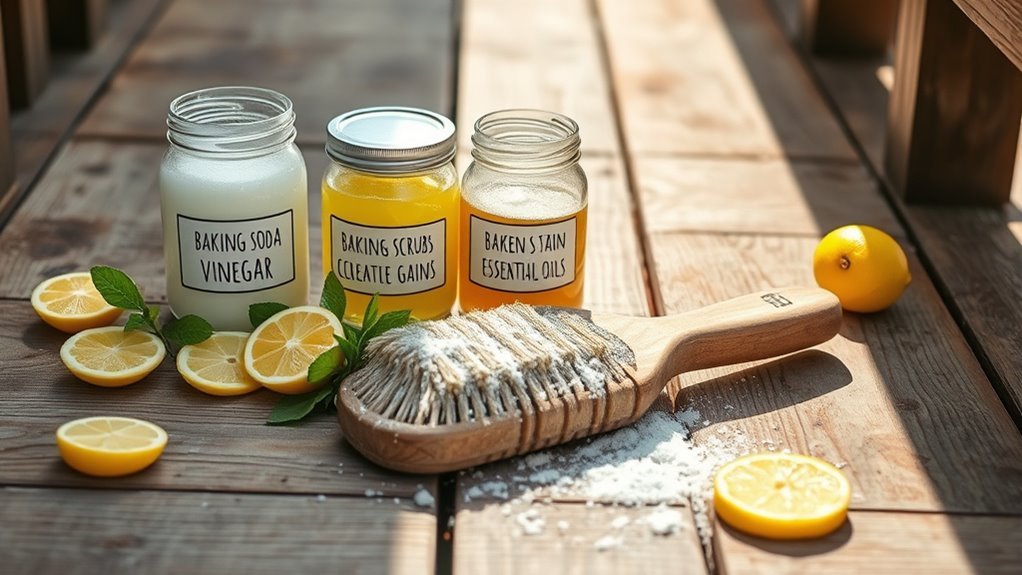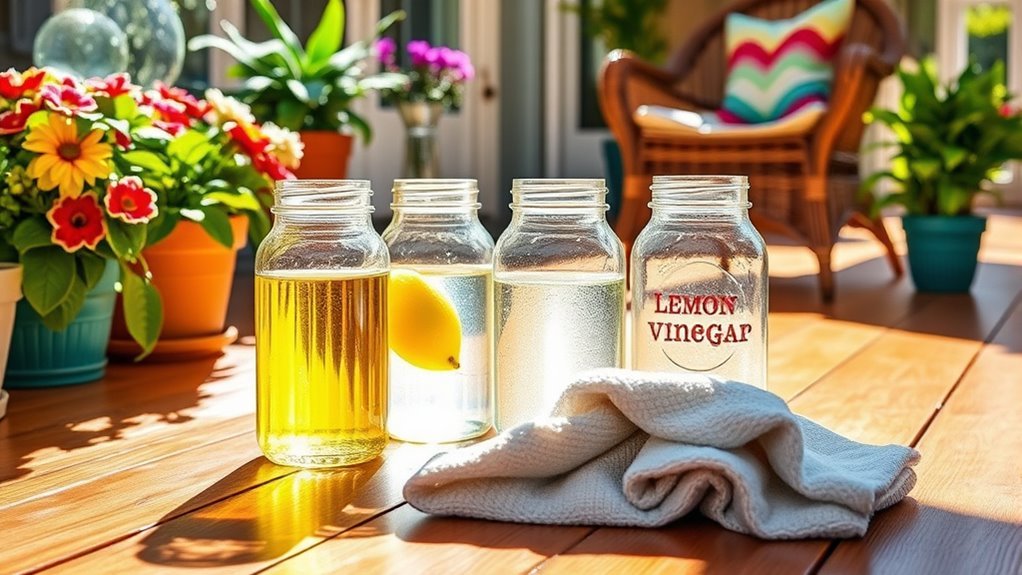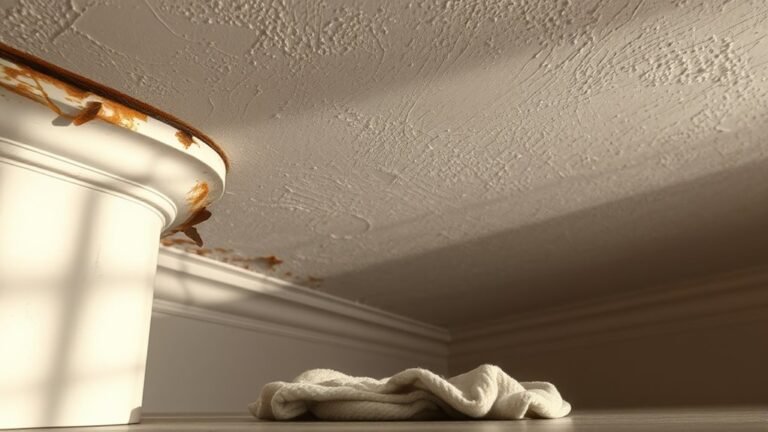Budget-Friendly DIY Cleaning Products for Front Porch
You can keep your front porch spotless on a budget by using simple DIY cleaners with vinegar and baking soda. Mix equal parts vinegar and water for an all-purpose spray; add citrus oil for a fresh scent. For tough stains, make a baking soda paste and scrub gently with a soft brush—add a splash of vinegar for extra power. For wood or concrete, eco-friendly blends protect surfaces while cleaning. Want to learn how to maintain a sparkling porch year-round?
Essential Ingredients for Homemade Porch Cleaners

Although store-bought cleaners are convenient, making your own porch cleaning products lets you control the ingredients and tailor the solution to your specific needs. Two essential ingredients to keep on hand are vinegar and baking soda. Vinegar benefits include its natural acidity, which cuts through grime and disinfects surfaces without harsh chemicals. Baking soda acts as a gentle abrasive, perfect for scrubbing dirt and stains without scratching your porch materials. Together, they create a powerful yet safe cleaning duo. You can mix vinegar with water for a simple spray to tackle mildew and dirt. For tougher spots, sprinkle baking soda directly and scrub with a damp cloth or brush. By mastering these basics, you gain freedom from chemical-laden products, saving money while keeping your porch fresh and inviting.
All-Purpose Natural Cleaning Spray Recipes
Once you’ve gathered your basic ingredients like vinegar and baking soda, you can start creating versatile cleaning sprays that handle a variety of porch cleaning tasks. For an all-purpose natural spray, mix one cup of water with one cup of white vinegar to harness vinegar benefits like disinfecting and deodorizing. Add 10-15 drops of citrus essential oil—lemon or orange—to boost cleaning power and leave a fresh scent, tapping into citrus power’s natural grease-cutting abilities. Shake well before each use and spray on surfaces like railings, furniture, and floors. Let it sit a few minutes, then wipe with a cloth. This simple recipe offers an effective, chemical-free way to maintain your porch’s cleanliness while embracing freedom from harsh commercial cleaners.
Gentle Scrubs for Tough Porch Stains

Many stubborn stains on your front porch need more than a spray to come clean. For effective stain removal, gentle scrubs are your best ally. You can create a simple scrub by mixing baking soda with a bit of water to form a paste. Apply this to the stained area, then use circular scrub techniques with a soft-bristle brush or sponge to lift dirt without damaging surfaces. For tougher grime, add a splash of white vinegar to the paste, but test a small spot first. Remember, gentle scrubbing prevents surface wear while tackling stains efficiently. By mastering these scrub techniques, you’ll preserve your porch’s look and extend its life—all while enjoying the freedom of using safe, budget-friendly DIY solutions.
Eco-Friendly Solutions for Wood and Concrete
When you’re caring for wood and concrete surfaces on your front porch, choosing eco-friendly cleaning solutions not only protects the environment but also helps preserve the materials’ integrity. For wood maintenance, mix equal parts white vinegar and water with a few drops of biodegradable soap to gently lift dirt without damaging the wood’s natural finish. Avoid harsh chemicals that strip protective oils. After cleaning, consider applying natural oils like linseed or tung oil to nourish and shield the wood. For concrete, a paste of baking soda and water can scrub away stains effectively. To enhance durability and prevent damage, use a non-toxic concrete sealing product made from natural ingredients. These eco-friendly steps guarantee your porch stays beautiful while respecting your freedom to care for it responsibly.
Tips for Maintaining a Sparkling Front Porch

Maintaining a sparkling front porch goes beyond just choosing the right eco-friendly cleaners for wood and concrete. You’ll want to incorporate regular seasonal maintenance to keep your space fresh year-round. Start by sweeping debris and wiping down porch furniture with a gentle, homemade cleaner to prevent dirt buildup. Check for any signs of wear or damage, such as peeling paint or rust, and address them promptly to avoid costly repairs. Don’t forget to clean light fixtures and remove cobwebs to brighten the area. During wetter months, guarantee proper drainage and dry surfaces to prevent mold. By staying consistent with these simple habits, your front porch will remain inviting and spotless, giving you the freedom to enjoy a welcoming outdoor space without hassle.
Frequently Asked Questions
Can These DIY Cleaners Be Used on Painted Porch Surfaces?
Think of your painted porch like a delicate dance partner—you want to keep the moves smooth without stepping on toes. When using DIY cleaners, always check for paint compatibility to avoid damage. Gentle ingredients like vinegar or mild soap usually guarantee surface safety, but avoid harsh abrasives. Test a small hidden spot first to see how the paint reacts. This way, you protect your porch’s finish while keeping it fresh and inviting.
How Long Do Homemade Cleaning Products Typically Last?
Homemade cleaning products typically have a shelf life of about one to two weeks, depending on the ingredients used. To keep them effective longer, you’ll want to store them in airtight containers away from direct sunlight and heat. Label your mixtures with the date you made them, so you don’t lose track. Following these storage tips helps maintain potency and guarantees you’re always ready to clean without worrying about expired solutions.
Are These Cleaners Safe for Pets and Children?
You’ll want to prioritize pet safety and child safety when using homemade cleaners. Most DIY products made from natural ingredients like vinegar, baking soda, and lemon are generally safe, but you should keep pets and kids away until surfaces dry. Avoid using essential oils or strong acids that can irritate sensitive skin or mucous membranes. Always store cleaners out of reach, and test a small area first to guarantee no adverse reactions happen.
Can I Store These Homemade Products for Future Use?
Sure, savvy storage is key! When storing homemade cleaners, seal them tightly in clean, clear containers to maintain their magic. Always apply product labeling with the creation date and ingredients to stay safe and organized. Keep them in a cool, dark spot to preserve potency. By mastering these storing methods, you’ll enjoy freedom from frequent mixing while ensuring your DIY solutions stay effective and ready whenever you need a quick clean-up.
What Should I Do if I Have Allergies to Certain Ingredients?
If you have allergies to certain ingredients, you should look for allergy alternatives that won’t trigger your symptoms. Don’t hesitate to make ingredient substitutions based on what you know you tolerate well. For example, if you’re sensitive to vinegar, try using lemon juice or baking soda instead. Always test a small amount first to verify it’s safe. This way, you maintain your freedom to create effective, personalized cleaning products without risking your health.






